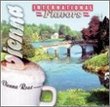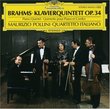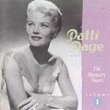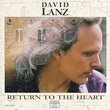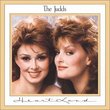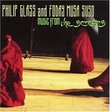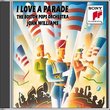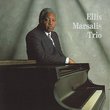| All Artists: J.S. Bach, Koopman, Schlick, Wessell, Demey Title: Bach: Complete Cantatas, Vol. 1 Members Wishing: 0 Total Copies: 0 Label: Elektra / Wea Release Date: 11/7/1995 Genre: Classical Styles: Opera & Classical Vocal, Historical Periods, Baroque (c.1600-1750) Number of Discs: 3 SwapaCD Credits: 3 UPC: 745099853624 |
Search - J.S. Bach, Koopman, Schlick :: Bach: Complete Cantatas, Vol. 1
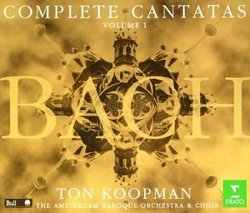 | J.S. Bach, Koopman, Schlick Bach: Complete Cantatas, Vol. 1 Genre: Classical
Bach's 200 existing cantatas (100 more have been lost) represent one of music history's most remarkable achievements. The first volume in Erato's ambitious but much-needed traversal of the complete canon contains nine cant... more » |
Larger Image |
CD DetailsSynopsis
Amazon.com Bach's 200 existing cantatas (100 more have been lost) represent one of music history's most remarkable achievements. The first volume in Erato's ambitious but much-needed traversal of the complete canon contains nine cantatas from Bach's early career. Except for "Christ lag in Todesbanden," these are lesser-known works, yet that doesn't mean they are of lesser quality. Here are some of Bach's most compelling choruses, accompanied by colorful and ingenious instrumental writing. Highlights abound, including the appendices that reproduce Bach's revised versions of cantatas 4 and 21. The choral singing is excellent: sensitive and agile, with unforced tone. Of course, there's Barbara Schlick's fluttery vibrato and occasional shrillness and tenor Guy de Mey's emphasis on "prettiness" over textual understanding. But from the very beginning of BWV 21 we hear confident, well-prepared music-making that carries throughout the recording. Perhaps most importantly--and largely due to Koopman's even-handed, purposeful direction--everything, including the sonic ambience, feels and sounds in proportion: a feature that bodes well for the whole series and makes this an excellent reference set. --David Vernier Similar CDs
Similarly Requested CDs
|
CD ReviewsHeaven laughs, earth rejoices. J. Pruim | Ten Boer, The Netherlands | 05/09/2000 (4 out of 5 stars) "Recently appointed 'honorary doctor' Ton Koopman with his Amsterdam Baroque Orchestra and Choir embarked a few years ago on a project to record all the Bach cantatas, both religious and secular. Koopman chose to record the cantatas in chronological order, and not by BWV number. Consequently, vol. 1 of the series (that eventually will include 20 volumes) includes 'early cantatas' composed in Weimar and Mühlhausen. It even includes the cantata "Nach dir, Herr, verlanget mich" BWV 150, which is assumed to be the oldest Bach cantata in existence, written before 1707, i.e. the Arnstadt period. The Amsterdam Baroque Choir and Orchestra show to be well at home in the music of Bach. Of the soloists especially Guy de Mey (tenor) and Klaus Mertens (bass) should be mentioned. Koopman's interpretations are allways with a certain drive, which sometimes tends to result in "nervousness". His relatively high tempi however do work as they give the music liveliness and lightness. In this first volume there is sometimes to much of this, leading to a distortion of the balance between liveliness and "draught" that Bach's music needs too. All in all this first volume promises a series of Bach cantatas that will make heaven laugh and the earth rejoice, to quote the opening lines of cantata BWV31 "Der Himmel lacht! die Erde jubilieret"." The best performance of Bach Cantatas (Volume 1) Corrado Speranza | Perugia, Italy | 12/15/2000 (5 out of 5 stars) "Ton Koopman starts the complete recording of Bach cantatas with some masterpieces written by Bach in Cothen and Weimar. I consider useful to remark the characteristics of each cantata so you can realize the differences among these masterpieces. BWV 21: This very famous cantata contains some remarkable pieces: the Sinfonia, the first chorus and an aria in F minor in the first part, and a duett (soprano-bass)and the final striking chorus with trumpets and timpani in the second part. N.B. There are also two arias (n.5 and 10)written for tenor, but in this recording they are singed by the soprano (Barbara Schlick). BWV 131: This cantata is based on the psalm "De prufundis"; the organic is composed only for oboe and strings but music is very moving. BWV 106: This magnific masterpiece is written for human soul; the tranquillity of music is given in the exact way by Koopman. Moreover there are 2 recorders and 2 violas da gamba that give a very ancient atmosphere. BWV 196: It's very short, but music is pretty. There are a lot of Italian reminiscences especially in the parts of violins. BWV 71: A very interesting cantata without recitatives; the string orchestra is enriched by oboes, recorders, trumpets, timpani, violoncello piccolo and organo obbligato. BWV 150: An other cantata with italian influences; Ton Koopman doesn't use the choir but only the solo voices. BWV 31: After a sinfonia with full orchestra there is a striking chorus in which you can examine the great skill of the Amsterdam Baroque Choir ( and also the Orchestra ). BWV 185: It opens with a strange duet for soprano and tenor with female choir; the first aria for alto, oboe and strings is enough famous. BWV 4: This very famous masterpiece was written to commemorate the death of Christ (Easter). Koopman gives a very good interpretation both for the sonorities and for the tempos without altering the atmosphere of great religiousness."
|

 Track Listings (17) - Disc #1
Track Listings (17) - Disc #1
